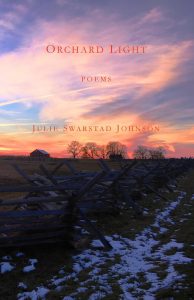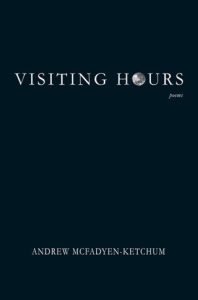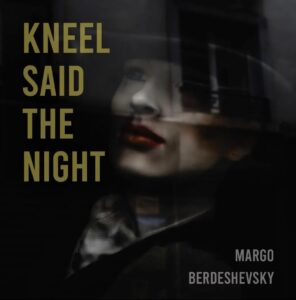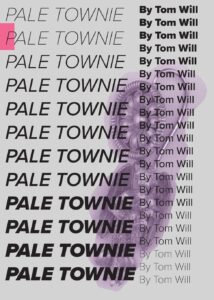Poetry. 39 pgs. Seven Kitchens Press. May 2020. ISBN: 97811949333695.
Tourist hub, turning point of the Civil War and site of Lincoln’s iconic cemetery address, Gettysburg is also one more small town in a swing state that just survived a zinger of an election year.
Orchard Light is Julie Swarstad Johnson’s response to her month-long artist residency at the Gettysburg National Military Park in 2018. Published this summer, the new chapbook throws sparks of quiet power. These poems are an example of what the National Parks Arts Foundation (NPAF) strives to achieve with its residency program. It brings artists working in many media to sites with geographical and cultural significance. It sends them home as ambassadors. What they learn and do benefits staff and visitors to the Park, and recipients of the resulting work.
The Orchard refers to the Peach Orchard, where one of many battles-within-the-Battle of Gettysburg took place. Joseph Sherfy, a farmer and Brethren (Dunker) pastor planted the orchard on their land. Johnson brings us details from members of the Sherfy family. The specificity of these poems, and the choice to focus on a few people in this way takes on extra poignancy in the COVID-19 era. What space is our space? From apartment balconies to pastures, shared rooms, backyards, houses, or vast expanses of property we are all taking stock of “our” places. Soldiers loaded their rifles and cannons here, in painstaking steps. Unmasked, self-designated militia members carrying assault rifles were on the Battlefield and in the heart of Gettysburg recently in a different state of tension.
“Grandmother Heagen Decides They Must Leave, July 2, 1863” opens with
Like St. Thomas, she cleaves to what has held her
the certainty of a house, the known reach
of the yard, its view of all that seems to change (6)
Seeped in temperature, mud, bullets, blood, mosquito-filled air, moonlight, laughter, silkworms, combs, granite, prayer, every poem here is tight and compelling. Johnson does justice to sound in the “wide, calling mouths” of the starlings, “the first sharp crack/ of a fire igniting in the camp, the “clatter of tin cups.” The poem that opens the collection, “Sleeping at Gettysburg” also opens the door from the present and brings us into the sphere of the Sherfy Family, whose voices are the voices of the book. Johnson lived and worked in a house on the Battlefield during her residency. The house witnessed the Battle.
“John Takes Back the Horses, July 8, 1863” is derived from a story told by Larry Sherfy, the great-great-grandnephew of Joseph about unidentified Sherfy boys who “stole” their horses back from Union forces and the way the Provost Marshal responded. The poem asks us to think of all a horse can do, including “the whisk and flick a tail can cut through air” or “think about/ a horse’s head pushed against your palm/ like a living stone, or her heat, fresh/ from the field, hot but never so hot as to burn you.” (12)
Lincoln and his words are summoned frequently these days, with all kinds of motivations. He is certainly felt and seen in Gettysburg in many interesting renditions from artist Wendy Allen, and in the statue on the square in front of the Hospital Auxiliary Thrift Shop and David Wills House, where Abraham Lincoln stayed the night before giving his address at the cemetery. In this town Lincoln is referenced in more ways and places than you can shake a stick at. Here are the last lines of “Otelia Hears President Lincoln’s Address, November 19, 1863.” Otelia, one of Joseph Sherfy’s children, was present in the crowd that day.
… The nation breathes with her,
strains to see the top of the president’s head as he stands
and says something she can’t quite hear, quiet
rushing in across them. Be still, and know
that I am God, she thinks, her home not the city of the psalm
but an orchard on a hill, burned and crushed
but still standing at daybreak, catching
the hush of the wind in every outspread leaf. (23)
Orchard Light is available through Seven Kitchens Press. Purchase it now through their website.
KATY GIEBENHAIN is the author of Sharps Cabaret (Mercer University Press). Her poems have appeared in, or are forthcoming in New Welsh Review, The Examined Life Journal, The Arkansas Review, Intima: A Journal of Narrative Medicine, Down to the Dark River: Contemporary Poems about the Mississippi River and elsewhere.
Like what you’re reading?
Get new stories or poetry sent to your inbox. Drop your email below to start >>>
OR grab a print issue
Stories, poems and essays in a beautifully designed magazine you can hold in your hands.
GO TO ISSUESNEW book release
I’ll Tell You a Love Story by Couri Johnson. Order the book of which Tim Jeffries said, “Surprising in their originality, filled with broken wisdom, and with a refreshing use of language and imagery, these are stories to savour and mull over one at a time but which add up to a satisfying whole.”
GET THE BOOK



